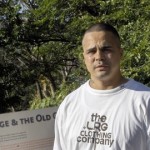You wouldn’t think Felix Castro cries at all by looking at him. He bounces and struts when he walks. His chest is broad, his knuckles massive. His hair is shaved close and two tattooed tears mark his right cheekbone. But in a plaza outside of his work near Washington Square, his eyes welled up as he recounted the students’ stories he heard when he visited Lillian Rashkis High School in Brooklyn as a youth counselor.
Castro is the founder and facilitator of ChangeNThoughts, a violence and gang prevention program in its infancy stage. He looks far younger than his age of 37 would suggest. Castro gets intense and emotional when he discusses his work. “You want to try the judicial. Did you try the rebuilding?” Castro said, before adding, as he does frequently, “What the students really need is love.”
While the non-profit organization of Castro’s making is gaining steam, he works at the Institute for Communicative Disorders (ICD) with emotionally and psychologically challenged students. Castro began working at ICD as an intern during his drug rehabilitation at Samaritan Village and stayed on full time, in part because of how he engages those in his charge. His supervisor, Heather Burrat, said Castro is able to help the students get under the anger of troubled youth and identify the vulnerabilities and issues that lead to violence.
As recently as five years ago he was arrested for burglary. Earlier incarcerations were for distributing drugs on school grounds. The wake up call came in the form of a heroin overdose after the last time he was released from prison. It was at that time that he decided that he was “tired of this life.”
Castro spent 14 years of his life in prison, giving him the street version of an advanced doctorate in gangs and violence. Tucked inside his office at ICD, under a picture of himself in cap and gown receiving his GED, Castro removed his mobile phone from his hip and read an excerpt from the book he is writing, “A Dove With A Broken Wing.” The book is fictional, but it is based on his life and experiences. He hunched over the tiny screen to read: All their lives people have been throwing away the key. Thoughts are contained in a 4 by 6 cage.
At the beginning of his presentations, Castro traces his own history that has led him to where he is now. He recounts a large family, he is the second youngest of 12, that was riddled with drug problems and abuse. Castro grew up as a result in a series of different foster homes and state-run facilities. His father was an abusive alcoholic who would have to be stopped by the older kids from abusing the younger kids.
His mother died when he was 10 of emphysema. Castro recounts the whole family standing around his mom’s casket and the father asking if they were happy for the Hell they put their mom through. He found a foster family when he was 11 who willingly gave him the love and structure he so badly craved, but he ran away at 16 to find his two older brothers who were selling drugs. His brother Marcus, who is currently serving time in Upstate New York, told him to leave and go back to the foster family, but Castro remained.
Castro became addicted to heroin at age 16 and began dealing drugs to feed and clothe himself. At 18 he was arrested for the first time on a drug charge and spent 10 months in jail before he was arraigned. “I was once again lost in the system,” Castro said. He remained in a system that he describes as preying capitalistically on young men of color. It is his goal to educate those living in similar circumstances to spare them the trip to prison.
Pain is still a major portion of his story. He recounts how his sister was killed on his birthday in August a few years ago during the blackout. At that point he decided what his new life mission was going to be and has worked to achieve it. He recently received his vendor’s number from the Department of Education and was asked to participate in the Joe Torre Foundation’s conference.
In the corridors of a Harlem high school in the middle of November, Castro directed some of the students from ICD before they presented a role-play he had written. They were running short on time and Castro was getting increasingly frustrated. As the two females asked to not be part of the presentation, Castro re-visited another role he is very familiar with: Recruiter.
The character Castro portrayed was a gang member attempting to pull off a drug sale. At one point he threatened, in character, to kill the family of a kid if he did not kill someone as ordered. It was a very convincing and intimidating performance as Castro’s body language tensed with every word. As the director his encouragement was more subtle as he cajoled, flattered and pleaded for the young women to perform. From his years as a gang recruiter Castro knows better than most the insecurities and weaknesses of youth.
He has renewed a relationship with his own children, aged 10 and 11, who live with his former girlfriend. “I am trying to make their dreams a reality,” Castro said, as he does frequently. He said it on the stage in Harlem to the raucous group of students waiting for the boys’ step competition to start. Castro wasn’t flustered. He waited for them to quiet down. It’s taken him a long time to get to this place and it was clear Castro wanted them to hear every word.
Joshua Cinelli attends the CUNY Graduate School of Journalism with a focus on politics, economics and international affairs. He graduates in December, 2008.

